Introduction to Sitecore Search
Sitecore Search serves as a headless content discovery platform designed to transform the way businesses and their customers interact with content. Its primary purpose is to streamline and enhance the search experience across various digital properties by integrating content from multiple sources into a unified, searchable index. This powerful tool leverages cutting-edge AI technology to provide predictive search capabilities and intelligent, type-ahead suggestions, thereby anticipating user needs and delivering fast, relevant results.
Through its headless architecture, Sitecore Search offers flexible integration options, allowing it to seamlessly function with existing websites and digital experiences without being tied to a specific front-end framework. This introduction will explore how Sitecore Search not only meets the modern demands of digital content discovery but also drives significant improvements in user engagement and satisfaction.
Key Features and Components of Sitecore Search
Sitecore Search provides a robust set of features designed to enhance the search experience for visitors to your website. By leveraging these capabilities, you can optimize search results, create advanced filtering and sorting options, and significantly improve the relevance of the content displayed.
Search Components
Search Results Widgets
Search results widgets are crucial components in the architecture of a modern website, designed to display relevant information to users based on their search queries. These widgets dynamically organize and present search outcomes in a user-friendly manner, allowing for easy navigation and interaction.
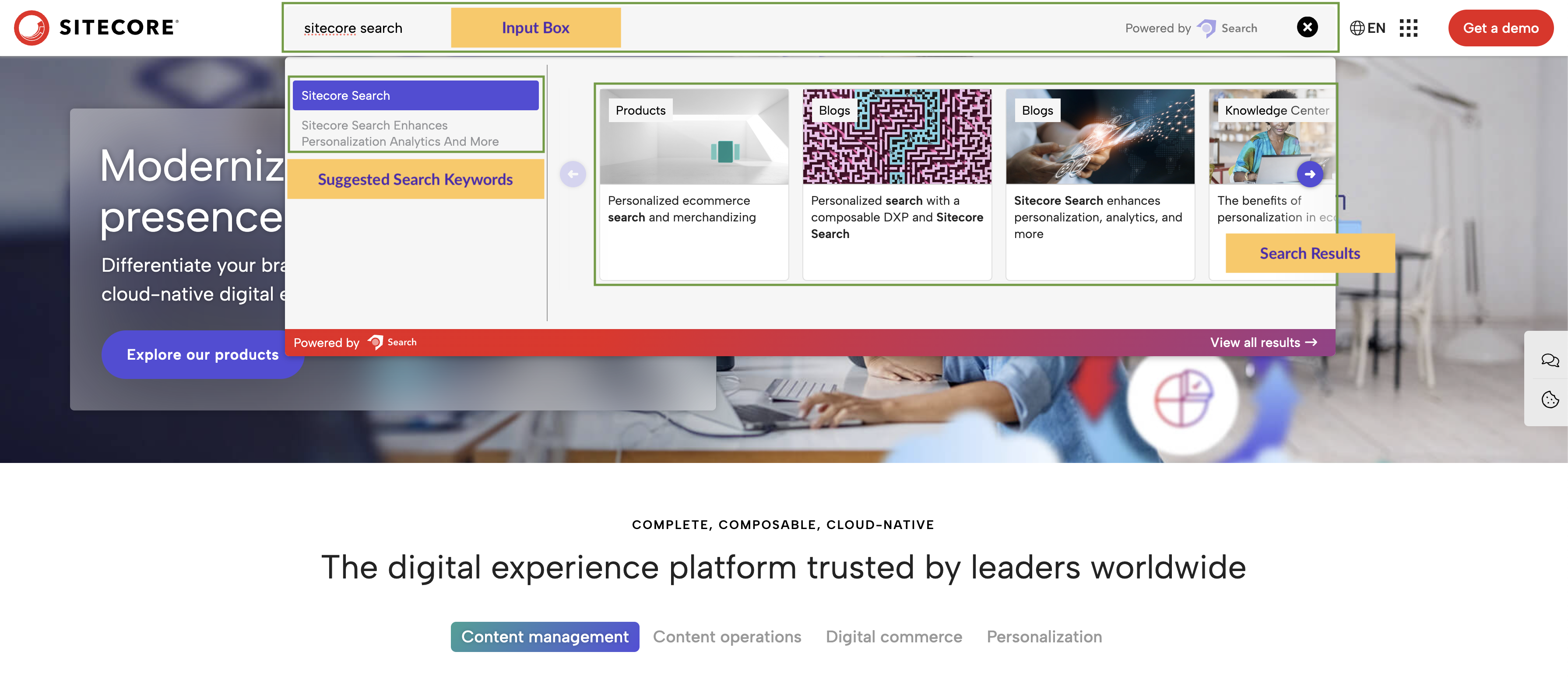
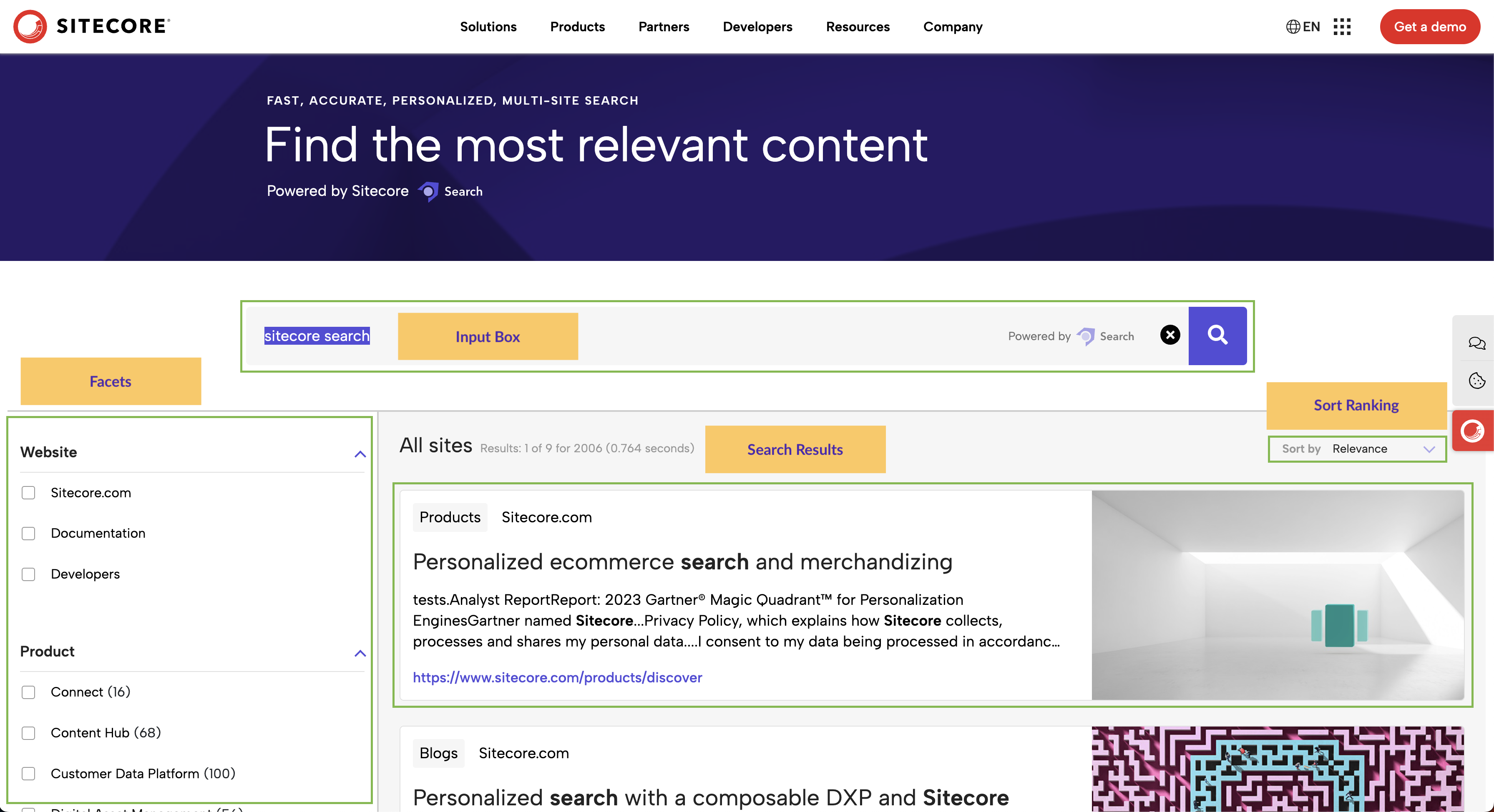
Input Box
The Input Box is where users start their search on a Sitecore Search interface. Placed prominently, usually at the top, it encourages users to enter search terms. This component is essential as it's the first interaction point with the search feature and is designed to be user-friendly, responsive, and quick to process user inputs.
Suggested Search Keywords
As users type in the Input Box, the "Suggested Search Keywords" feature provides real-time suggestions based on the text entered. This helps enhance search accuracy, reduce typos, and suggest relevant terms automatically. These suggestions are generated from popular searches and related content, helping users refine their queries and discover more relevant information quickly.
Search Results
The "Search Results" display the content relevant to the user's query. This section shows the effectiveness of the search engine by listing results with titles, short descriptions, and sometimes images. Results are sorted by relevance with options to sort by other criteria like date or popularity. This area is designed for easy navigation, allowing users to quickly find the information they're looking for.
Whether implemented on e-commerce platforms, corporate websites, or digital archives, search results widgets not only enhance user experience by providing quick and relevant information but also play a key role in improving site engagement and content discoverability.
Filters
Filters in Sitecore Search allow you to define and limit the content returned in search results. They can be implemented as visible facets for user interaction or operate behind the scenes to tailor the content displayed.
For example, a filter might be set to display only those blogs with a blog_status of "published" to specific users based on the search context. This selective visibility ensures that users see only the most relevant and appropriate content.
Facets
Facets dynamically categorize search results based on attribute values, offering users an intuitive way to refine their search queries. This feature is especially beneficial when managing extensive content inventories. By applying facets related to content type, customer reviews, or related products, users can navigate and filter large datasets effortlessly, enhancing their search experience.
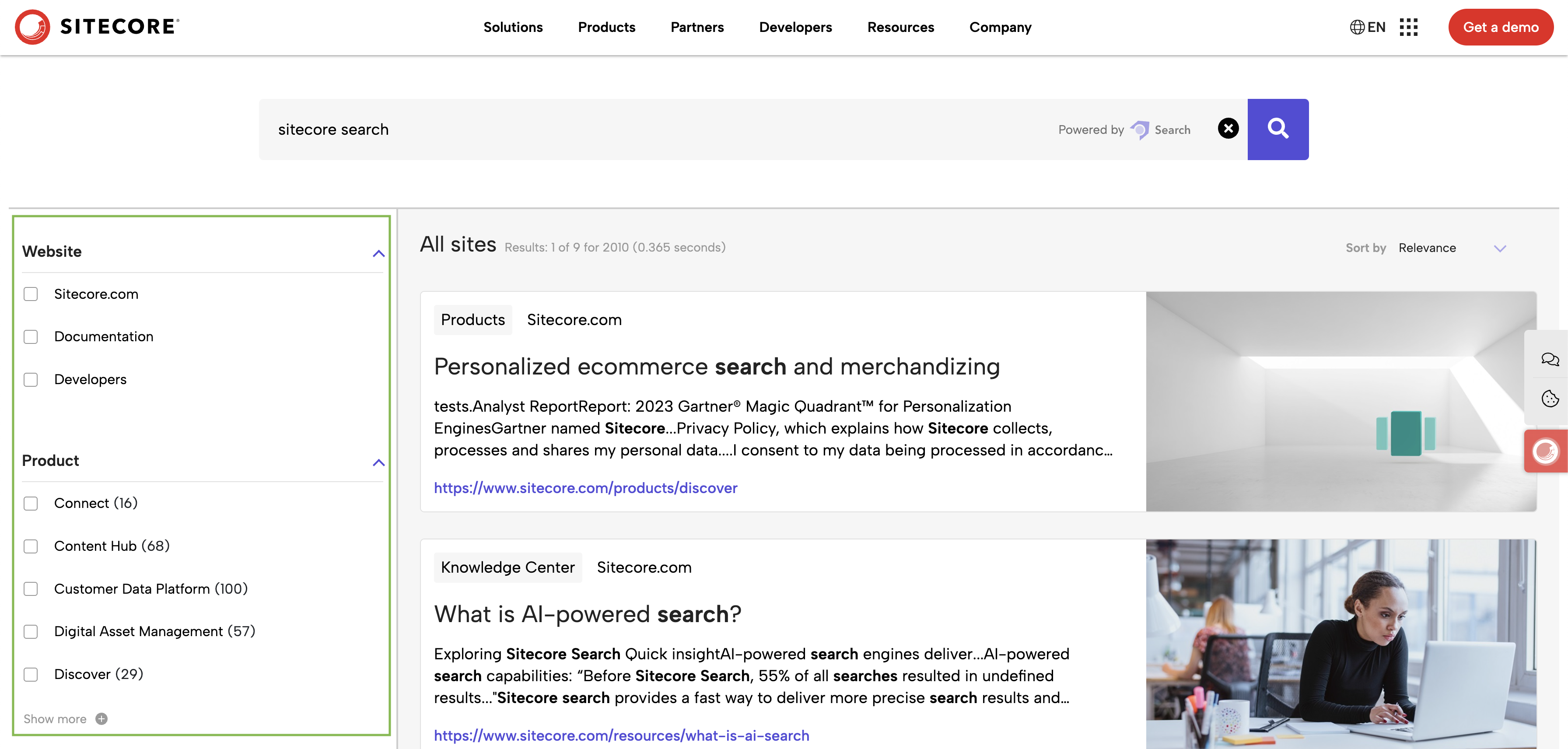
Personalization
Personalization is at the heart of Sitecore Search's functionality. Utilizing machine learning, Sitecore Search analyzes visitor data to understand individual preferences and past interactions. This insight allows the system to tailor search results uniquely for each user, ensuring a highly relevant and personalized experience.
An example of this can be used at the bottom of a blog with “You May Also Like” content that is relevant to the page they are on.
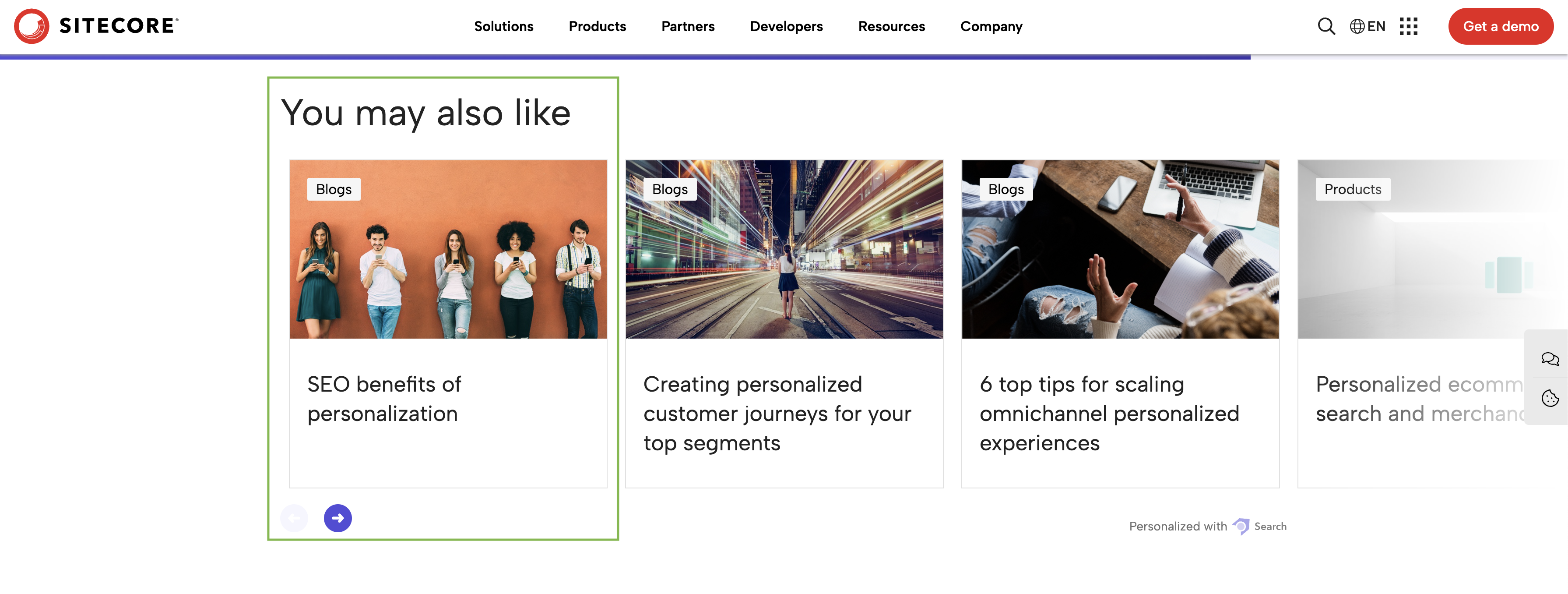
Questions and Answers
This feature leverages machine learning to generate relevant question-and-answer pairs based on user queries. Integrating these into the search results can enhance content discovery, providing a "people also asked" section that helps users find additional relevant information effortlessly.
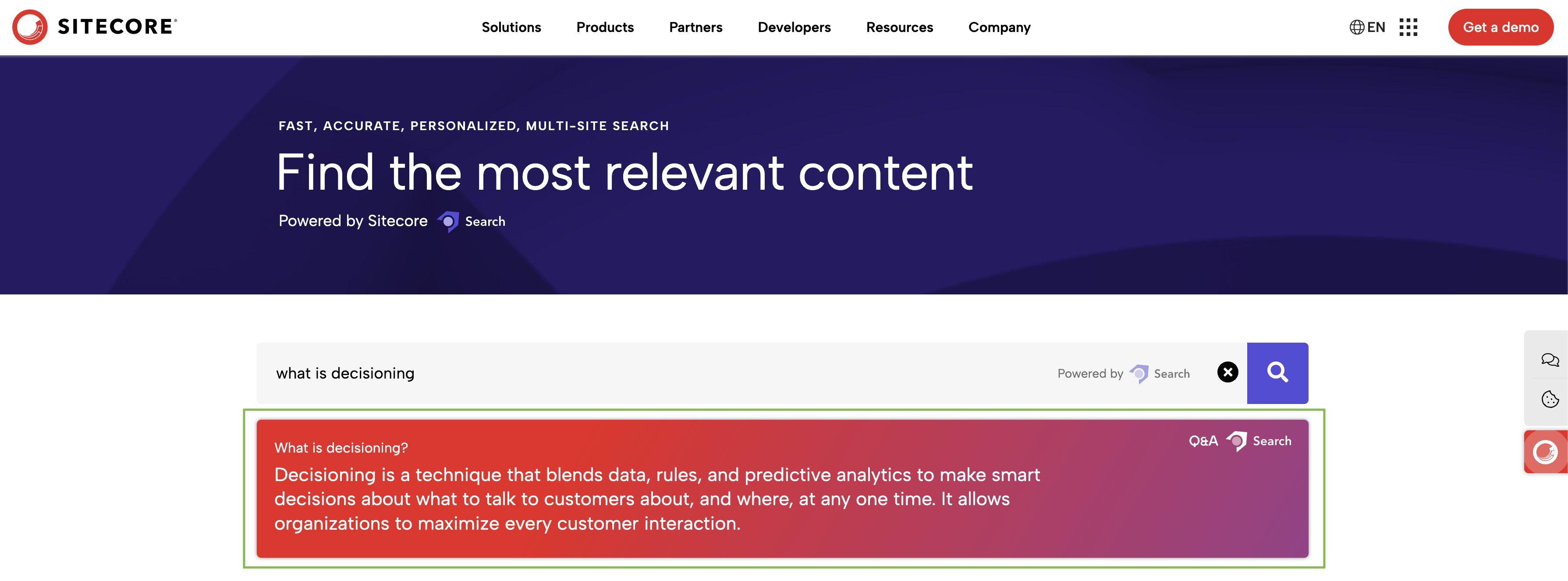
Search Ranking
Sitecore Search employs a sophisticated algorithm to internally rank and score content based on relevance. Additionally, you can influence this process through custom ranking, allowing you to prioritize content based on specific criteria, such as recent user interactions. For instance, you could configure the search to favour content that has received more clicks over the past week, thus aligning search results more closely with user interest and engagement. For example, Search can give more importance to items that were interacted with the most in the past week using custom ranking. The following diagram shows how the Sitecore Search ranking works for a result set of six items:
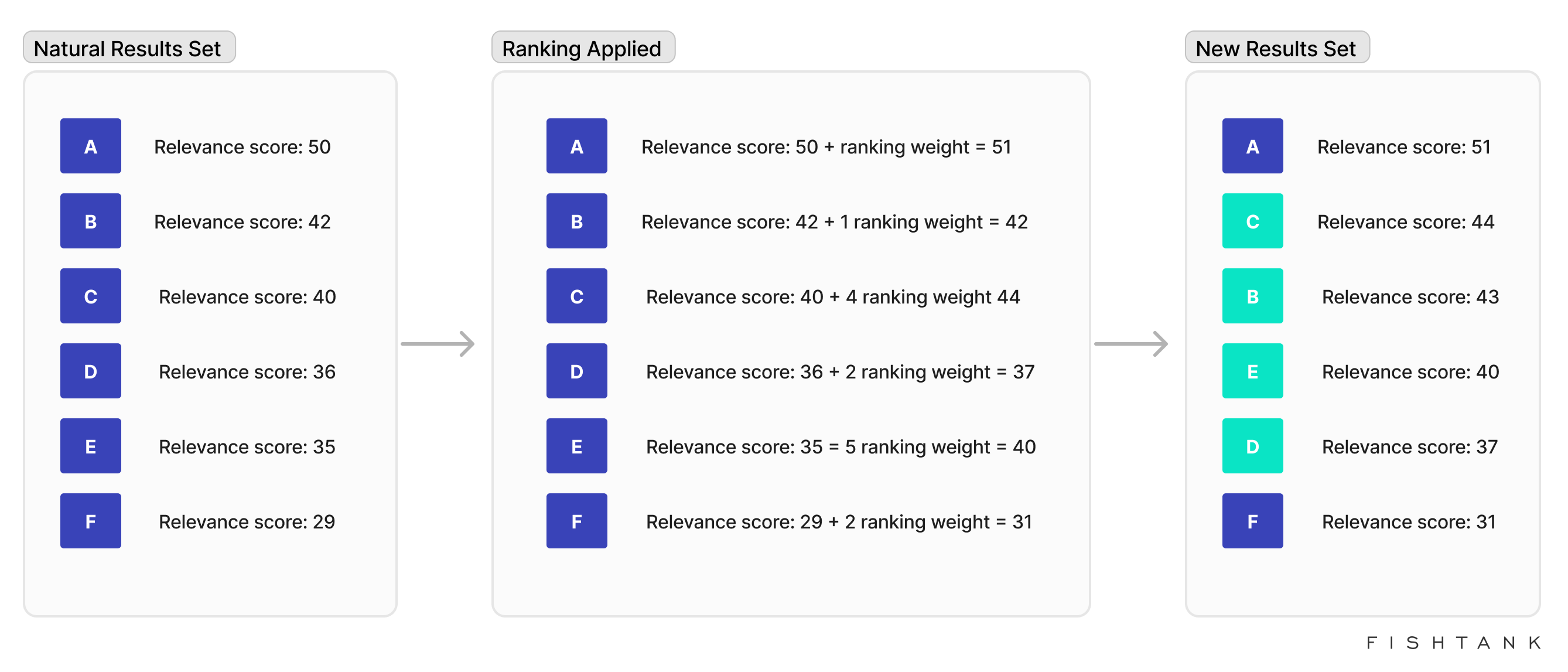
Sorting Options
Sorting options empower users to order search results according to various criteria, such as alphabetical order or by date. For instance, if the search results include a list of movies, users could sort these by title or year of release, facilitating easier navigation and selection based on their preferences.
Suggestions Blocks
Suggestions blocks enhance the search input process by auto-completing queries, correcting typos, and suggesting relevant content. If a user begins typing "headless," the search might auto-complete to suggest "headless commerce" or "headless architecture," or correct a misspelling like "heafless" to "headless," directly improving the efficiency and accuracy of the search process.
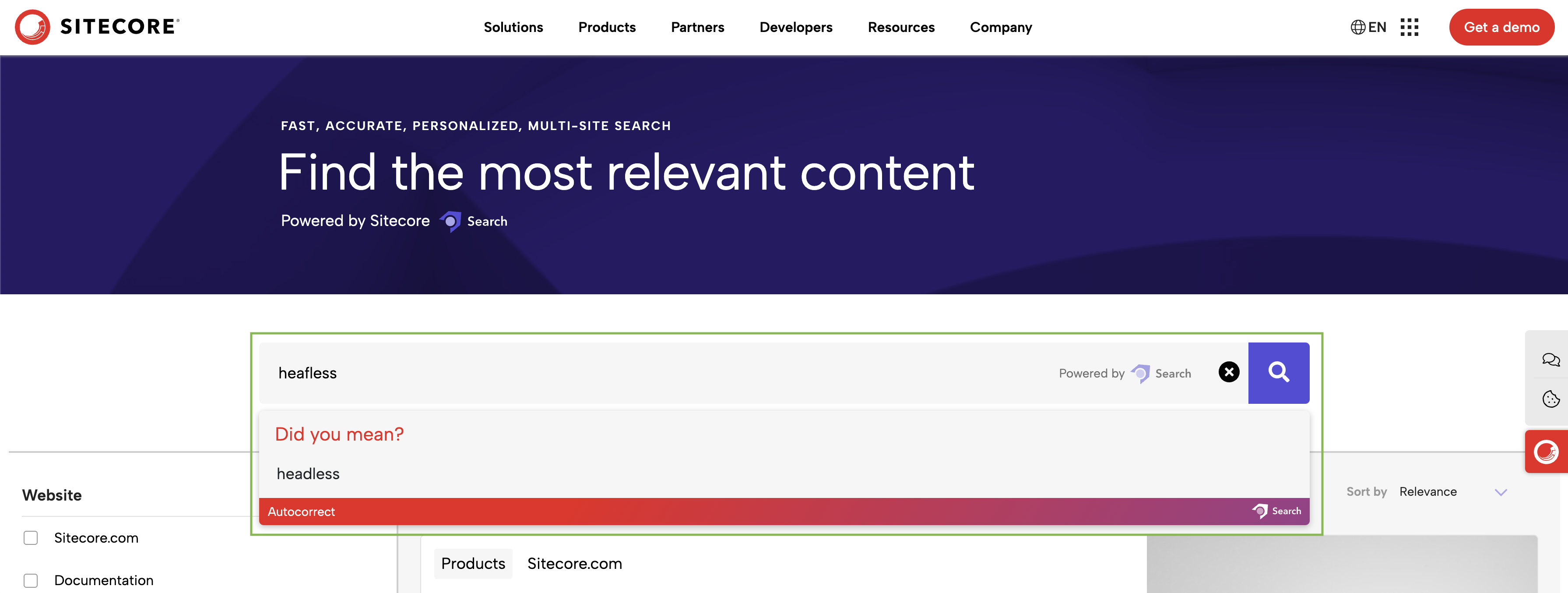
Textual Relevance
Textual relevance determines how closely content matches the user's query, focusing on specific content areas like titles and descriptions. By configuring which parts of your content are searched, you can ensure that users find the most relevant articles, blogs, or news items that directly correspond to their search terms, such as "artificial intelligence."
These features collectively ensure that Sitecore Search not only meets but exceeds user expectations for fast, accurate, and intuitive search experiences, thereby driving better engagement and satisfaction on your digital platforms.
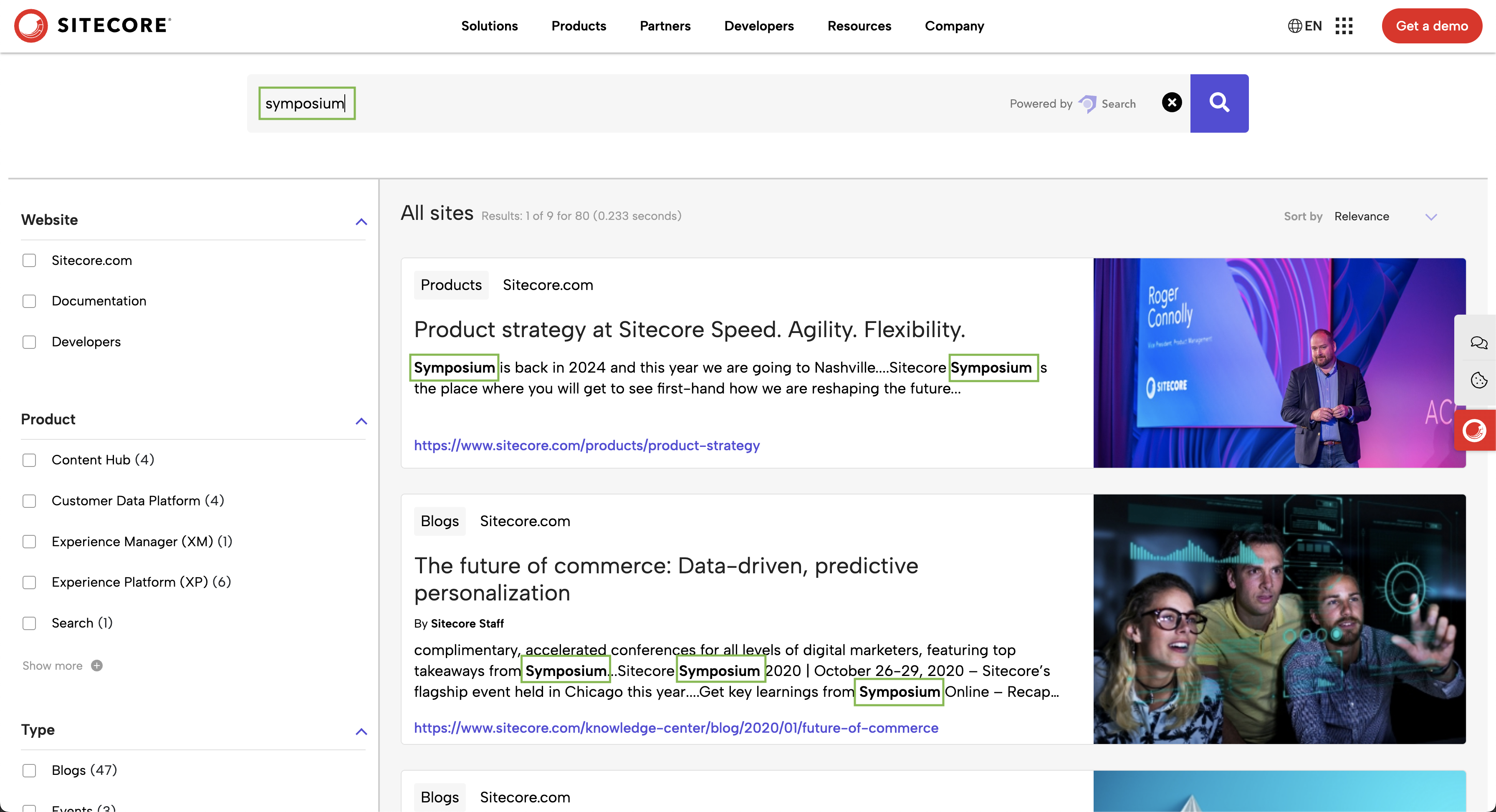
Pages
Pages in Sitecore Search act as containers for one or more widgets. They allow for the creation of tailored search experiences across different sections of a website. For example, a homepage and a product page might use the same search results widget but configured differently to suit the context of each page.
Rules
Rules in Sitecore Search dictate how content is displayed or hidden within widgets based on specific conditions. These can be incredibly powerful for targeting content to different user segments or personalizing the search experience based on user behavior. For example, rules can be used to promote certain products during a sale or to hide outdated articles from search results.
Indexing and Retrieval
Index Document
An index document is created when Sitecore Search indexes content, turning it into a structured format that can be quickly retrieved by the search engine. Each piece of content, whether it's a webpage or a PDF document, is converted into an index document containing essential attributes like title, description, and any other relevant metadata.
Attributes
Attributes are key to defining and organizing the content within Sitecore Search. They are used to tag documents and help categorize them under various criteria, such as content type, date of publication, or author. Attributes are essential for enabling precise filters and rules that improve the relevance and accuracy of search results.
Entities
Entities represent individual units or concepts within Sitecore Search, such as a person, a product, or an event. They are defined by their attributes and are crucial for organizing and retrieving content in a meaningful way. Entities help in building a structured search experience that aligns with the informational hierarchy of a website.
Tags
Tags are crucial in Sitecore Search for linking documents to relevant entities based on defined tag configurations. This tagging system ensures that each document is associated with the correct entity, improving the organization and retrieval of indexed content.
Web Crawler
A web crawler in Sitecore Search browses the internet to index new and updated content, playing a key role in maintaining a current and comprehensive search database. This automated tool scans websites and collects data essential for the search functionality.
Sources
Sources in Sitecore Search define the specific content to be indexed, setting the scope of what the search engine will access. Configuring a source involves specifying starting points and indexing rules, which dictate how the content is crawled and stored.
Triggers
Triggers in Sitecore Search initiate the indexing process, acting as the starting points for content discovery. These can be various inputs like sitemaps or RSS feeds, and if multiple triggers are set, the system processes them sequentially.
Content Management
Content Collection
The content collection in Sitecore Search manages and organizes all indexed documents, providing a centralized location for administrators to view and interact with the indexed content. This collection is crucial for maintaining the integrity and usability of the search system.
Extractors
Document extractors in Sitecore Search are responsible for creating index documents from URLs, extracting relevant HTML tags, and defining attributes. Extractors can be customized for different sections of a website, ensuring that each content type is appropriately tagged and indexed according to specific rules. For example, separate extractors might be used for different sections of a banking website to handle unique content structures effectively.
The Customer Engagement Console in Sitecore Search
It's important to note that these features can be configured in the Customer Engagement Console (CEC) and can also be overridden or adjusted with additional settings at runtime. This flexibility allows you to tailor the search experience precisely to meet the needs of your users and align with your business objectives.
For more information on the CEC, read our blog A Guide to the Sitecore Search Customer Engagement Console.
Wrapping Up Sitecore Search Features
In conclusion, Sitecore Search offers a robust suite of features designed to enhance the search experience across various digital platforms. From dynamic widgets and flexible pages to sophisticated rules and detailed attributes, each component works together to provide precise and relevant search results.
Whether through the use of intelligent indexing documents, the strategic deployment of entities and tags, or the efficient crawling and sourcing of web content, Sitecore Search equips businesses with the tools necessary to deliver a powerful, personalized search experience to their users. By understanding and implementing these features, organizations can significantly improve content discoverability, user engagement, and overall satisfaction, ensuring that their digital presence is both effective and user-centric.




